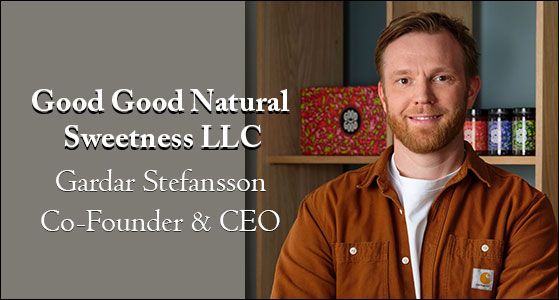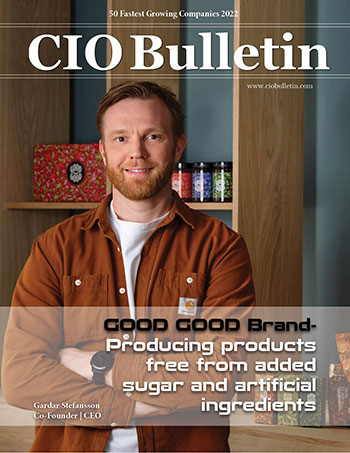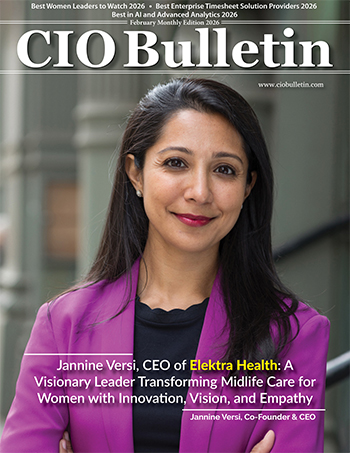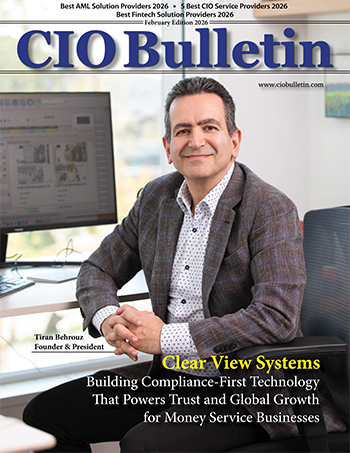50 Fastest Growing Companies 2022
CIO Bulletin

Sugar has a bittersweet reputation when it comes to health. If you are trying to reduce sugar and calories in your diet, you may be turning to artificial sweeteners and other sugar substitutes. Reducing your intake of refined sugar can be challenging, but given how incredibly harmful sugar can be, it’s definitely worth the effort.
The GOOD GOOD products use natural sugar substitutes and increased fruit content to make food that tastes amazing and are also suitable for the modern consumer. GOOD GOOD is a fast-growing selection of keto-friendly jams, snack bars, chocolate spreads, syrup, mixes and natural sweeteners. Founded in Reykjavík, Iceland, in 2015, the aspiration was to create a healthier and happier world where consumers enjoy the sweet things in life without worrying about the health risks of added sugar.
With its expanding line of products sweetened only with stevia, erythritol and/or other natural sweeteners, GOOD GOOD always aims to deliver on taste and health while prioritizing customer well-being, sustainable business practices, and continuous innovation.
Following are excerpts from a conversation with Gardar Stefansson, Co-founder and CEO of GOOD GOOD Natural Sweeteners LLC.
Q. Why was GOOD GOOD founded? How has the company grown in the years since its inception?
To begin with, we were a natural sweetener company, focused on selling sweeteners, mainly in Europe. However, our sales plan did not meet our expectations and facing the reality of having too many products that could expire left the three of us co-founders, pondering solutions. Either let the expired product go to waste and take the financial loss, or pivot and adapt. Something Icelanders have a gritty knack for.
Several kitchen trials later, we developed a recipe that brought to the market a jam using more fruit than traditional purveyors, without the added sugar. Thus, GOOD GOOD was born. Today this is our hero line – jams.
Q. What gap does GOOD GOOD fill in the market?
Most people want to live long and live well. The problem is two-fold. First, a high-calorie sugar-to-diet ratio defines modern eating. Leading to a host of health complications, i.e., 43.2 million people living with diabetes in the US alone, not to mention the increase in pre-diabetes across the U.S. Second, diet plans and weight management plans have a failure rate of 95%. So, we are basically providing assistance to enrich people’s lives, by making it easy for them to avoid added sugar.
Q. What are the main values of the company?
Q. Can you explain your products/offerings briefly?
We currently have four principal product lines:
Q. What were some of the challenges faced by the company in its journey to where it stands today? How did you overcome those challenges?
Even though we are a spread brand today and created our winning product: jams, early on it took us some time to get established and get the category buyers to buy into our new jam innovation. It wasn’t until we had proven ourselves online that we picked up interest with retailers and category buyers. From the beginning our goal has always been to create amazing products, building a brand with an emotional connection to our consumers.
USA, Canada and Europe are different markets with different regulatory bodies. Although our ingredients are natural and allowed in all market areas, the legality of launching a food product is complicated and requires extensive preparatory work. We studied the regulations for each country, becoming experts in the legality of food products within these markets. So, as our business grew, we hired a talented quality manager. Entrepreneurs need to do the work to make things happen.
From the start, as founders we had high hopes for where we wanted to go, but for that of course you need capital. Getting investors on board was a key factor for us and telling our story and portraying our vision was how we got a buy-in, that was a key element; our story and vision. Being authentic, realistic and up-front was a key factor for us and is every day.

Q. As an Icelandic company, what specific challenges have you faced regarding your unique geographic location?
As Iceland is an island in the middle of the North-Atlantic, making our products in Iceland is quite expensive. Hence, we have always had to outsource our production closer to the markets we operate in. Today we design and develop everything in Iceland but most of the production takes place in the Netherlands. The asset of being stationed in Iceland is of course the factor that we have a modern infrastructure, renewable energy, and direct connection to almost all major cities in North America and Europe.
Other than that, we believe that being from Iceland is a strength, we consider nothing to be easy. Everything is a challenge and you need to up your game if you are going to become a serious player in the CPG world – no matter where you are located.
Q. Why is it essential that Good Good’s products do not contain added sugar or have other natural sweeteners?
It’s vital for us to be a mission-led company and when brands lose sight of their values or their customers, then it is very easy to become just any other brand.
Q. How do you ensure product authenticity?
Annually GOOD GOOD is audited by the global leaders in Food Safety Standards the BRCGS.
70% of the top 10 global retailers accept or specify BRCGS, 50% of the top 25 global manufacturers specify or are certified to BRCGS. BRCGS is a GFSI certified body and regarded as the benchmark globally for best practice in the food industry. We only source materials from GFSI certified suppliers. In Europe, GMOs are banned by the EU equivalent to the FDA (EU Food and Drug Commission). Hence, all GOOD GOOD products are non-GMO by default. However, taking this one step further as organization we have have our Jam line certified by the non-GMO Project Verified and all of our other products are in the process of being verified.
Q. Being a food processing company, Good Good must have its share of food waste. What steps has the company taken to ensure that its processes are sustainable?
Coming from a country where sustainability hugely important we certainly recognize and accept the need to continually develop sustainable practices. Of course, the picture is multi-faceted with global inequalities being more pronounced, ingredient costs climbing and global warming an environmental issue turning into a major political issue. We are actively taking steps to find new ways of meeting present needs without compromising future viability. This is an on-going process and you can never be perfect, but sustainability is vital to succeed in the long term.
Q. Why are most of your products keto-friendly? Are your products also suitable for other diets?
One of our co-founders is an active keto dieter and I think in one way or another it was natural for us early on to associate ourselves with keto. But we are not a keto brand and our products fit multiple food lifestyles. It varies from product to product but for example, our jams are suitable for vegans, vegetarians, gluten intolerance, keto and non-glycemic diets (suitable for diabetes management). We realize our consumers are following multiple food lifestyles, so it is important that our products are robust, versatile and don’t pigeonhole us to a particular fad.
Q. It is lovely that you have recipes for your customers on your website. What made you include recipes on the website?
Recipe ideas are a great way to get people to try new things and make life sweeter and more delicious. If the content helps one person in some way, that’s enough for us. This follows our values neatly, of constantly seeking to enrich the customer experience. Recipes content adds another touchpoint and interaction with the customer, something every brand wants more of. Something we will continue in the future.
Making food healthy for people without adding excessive sugars
Gardar Stefansson is a serial entrepreneur that has been involved in 3 startups since graduating university in 2011. During his university years, he started developing a business idea that later on turned into two artisan salt companies, hence his whole professional career has been devoted to building food startups. In 2015 Gardar was approached by Agnar Lemacks and Johann Ingi Kristjansson to start GOOD GOOD. GOOD GOOD offers quality no-added-sugar, low-carb & keto-friendly products that taste good. They’re ideal for people who want to reduce or eliminate sugar from their diets and/or suffer from diabetes. GOOD GOOD builds on Icelandic ingenuity & CPG knowledge, and key elements of GOOD GOOD’S business are including product design, sales and marketing, supply chain management, and quality control are done from my Iceland.

Insurance and capital markets







